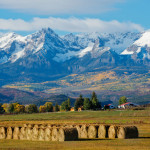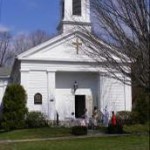Grace
A sermon preached at the Church of the Incarnation, San Francisco, on July 5, 2015, by Christopher L. Webber.
 Many years ago my best friend and I decided to go to a conference in Wichita Kansas. You can guess how long ago this was by the fact that we decided to drive there from Long Island. We stopped overnight in Pennsylvania and got to Wichita late in the afternoon, checked in to the hotel, and went down to the restaurant for dinner. It wasn’t a formal conference dinner with speakers and all that; just dinner in the hotel restaurant before the opening session. We sat there for a long time and finally my friend said, “Does it seem as if we’re being ignored?” I just figured the staff was really busy because the place was full and they’d get to us sooner or later. Eventually they did. But my friend was black and he saw things out of different experience.
Many years ago my best friend and I decided to go to a conference in Wichita Kansas. You can guess how long ago this was by the fact that we decided to drive there from Long Island. We stopped overnight in Pennsylvania and got to Wichita late in the afternoon, checked in to the hotel, and went down to the restaurant for dinner. It wasn’t a formal conference dinner with speakers and all that; just dinner in the hotel restaurant before the opening session. We sat there for a long time and finally my friend said, “Does it seem as if we’re being ignored?” I just figured the staff was really busy because the place was full and they’d get to us sooner or later. Eventually they did. But my friend was black and he saw things out of different experience.
On the way back we needed to find a motel for the night and stopped at one in the middle of Missouri. I went in first with my friend right after me and told the clerk, “We need a room for two.” “Sorry,” he said, “but we’re full. There’s another place down the road that might have a room.” Well, maybe they were full. It’s not impossible. I’m sure it happens. But I’ve gone into a lot of motels before and since and never been told, “We’re full” except that one time. Maybe the clerk was telling the truth, but because my friend was black, we couldn’t be sure. And I realized that if you are black in America that kind of thing happens a lot and you can’t ever be sure you’re being told the truth.
I remember another time when my friend came for a visit, and arrived in a rage because he’d been stopped, basically, for driving while black. Later he became a bishop but he died before he was 50 of a heart attack. He had chronic high blood pressure and nothing in the world we live in was helpful for that condition.
We’ve been reading through my favorite part of the Bible, for the last month and will be until almost the end of August, seven more weeks, working through the six books of Samuel, Kings, Chronicles. We have two weeks coming up for David and Bathsheba; don’t miss it! But we read these books because they describe the rise and fall of the first Jewish state. They show us God at work in history, shaping a nation and people. It’s a brilliant depiction of the interplay of personalities and power, the interplay of a high calling and the realities of human weakness. Today’s first reading ends: “David became greater and greater, for the LORD, the God of hosts, was with him.” That’s the critical factor: “the LORD, the God of hosts, was with him.”
You see, the Old Testament is the story of how God was at work in one tribe, one nation, “to shape” as the Bible says, “to shape a people for God’s own possession.” The project had a brief time of glory under David and Solomon and other times, more times, of exile and defeat. But always there were prophets to call them back to God’s purpose for them, to explain to them the relationship between their faith and their fortunes, to call them to repentance and renewal, to remind them of God’s purpose, God’s promise.
And then, two thousand years ago, the time was right for God to take the next step, to take the knowledge of God the Jews had acquired and expand it beyond one nation, to send the knowledge of the God of Israel out to every nation, to plant in every language and tribe and nation and people the knowledge of a God of love, the knowledge of a Creator with a purpose, the knowledge of a redeemer able to bear the crushing load of human sin and failure and take it away for ever.
The early Christians understood that the gospel was universal; it was good news for everyone, for everyone, unlimited by nation or race. One early Christian wrote that “Every  Fatherland is for them a foreign land and every foreign land a Fatherland.” Christians were at home everywhere but never quite comfortable anywhere. Christianity, in other words, was no longer to be a national faith but a transformative faith. As such it transformed the Roman Empire and survived the collapse of the empire and embedded itself in the rising nation states of Europe adapting itself to northern Europe as Lutheranism and Calvinism to England as Anglicanism to southern Europe as Roman Catholicism, to eastern Europe as Orthodoxy.
Fatherland is for them a foreign land and every foreign land a Fatherland.” Christians were at home everywhere but never quite comfortable anywhere. Christianity, in other words, was no longer to be a national faith but a transformative faith. As such it transformed the Roman Empire and survived the collapse of the empire and embedded itself in the rising nation states of Europe adapting itself to northern Europe as Lutheranism and Calvinism to England as Anglicanism to southern Europe as Roman Catholicism, to eastern Europe as Orthodoxy.
So Christian faith was at work in a variety of ways, transforming cultures but becoming divided and divisive in the process because while Christians had a generally valuable influence within their various cultures, they also adapted themselves to those cultures so that the Christians in Germany no longer understood the Christians in Spain and the Christians in Italy no longer understood the Christians in Holland and even the Christians in Scotland didn’t understand the Christians in England and sometimes the Christians in England didn’t understand each other. And all of those differences came here: all those multiple expressions of Christianity enriching this nation and also dividing us but creating the yeast that would begin to do what Christianity had not done before: to transform society.
You see, in the Roman empire Christianity was too young and too weak to do much more than change individuals and in the middle ages and later it was too divided to do more than influence nations. In the Roman empire, slavery was simply accepted. Peter and Paul just assumed that there would be slavery and they taught slaves how to be Christian slaves and owners how to be Christian owners. It never imagined that slavery as an institution could be eliminated. It also never occurred to them that marriage could take new forms or that human beings could make choices about the environment. At the end of the Bible we do read of a new heaven and a new earth, indeed, the Second Epistle of Peter says, “we are looking forward to new heavens and a new earth, where righteousness is at home.” Imagine that! A world where it’s normal to do justice! But the early Christians couldn’t imagine the details, couldn’t imagine we could get there before the second coming. And who could blame them when you see what a mess we’ve made of it even here, even here.
But suddenly, just in the last two weeks, we have been able to begin to visualize a whole new world in which God is at work in us, at work in you and me and even the Supreme Court to change not just individuals, not just nations, not just societies, but the shape and pattern of human life. We’ve had a shooting in South Carolina, two Supreme Court decisions, one about marriage and one about health care, and along with that the constant new weather crises that begin to make believers even out of skeptics and deniers. So there are signs of hope. Change is possible. We can do better. We can be moving on toward a truly transformed society. Just maybe we can move beyond racism and tear down the flags that  endorse it. Just maybe we can look at human sexuality in broader ways and ask God’s blessing on loving, stable relationships that move beyond the narrow limits of biology. Just maybe we can look at the violence that lurks in all of us and begin to limit the use of the weapons that make that violence so terribly dangerous. Maybe we can move beyond the Affordable Care Act to a truly universal health care system. Maybe we can begin to use the tools available to us to move beyond a fossil fuel economy to a world that gets clean energy from the sun instead of deadly, destructive energy from fossil fuels. And perhaps most important of all can we as Christians be the yeast that enables those transformations, the yeast that transforms the lump. It’s the role of yeast to disappear as it does it’s work. Jesus said we are to be the leaven in our world, not to compel transformation but to be the yeast at work invisibly, within.
endorse it. Just maybe we can look at human sexuality in broader ways and ask God’s blessing on loving, stable relationships that move beyond the narrow limits of biology. Just maybe we can look at the violence that lurks in all of us and begin to limit the use of the weapons that make that violence so terribly dangerous. Maybe we can move beyond the Affordable Care Act to a truly universal health care system. Maybe we can begin to use the tools available to us to move beyond a fossil fuel economy to a world that gets clean energy from the sun instead of deadly, destructive energy from fossil fuels. And perhaps most important of all can we as Christians be the yeast that enables those transformations, the yeast that transforms the lump. It’s the role of yeast to disappear as it does it’s work. Jesus said we are to be the leaven in our world, not to compel transformation but to be the yeast at work invisibly, within.
Perhaps the most remarkable of all the remarkable events in the last two weeks was the President’s eulogy in South Carolina. Remarkable in many ways, but not least that it went beyond the usual, political, “God bless America” to point out that, as I’ve been saying, and the President said it, “that to put our faith in action is more than individual salvation, it’s about our collective salvation; that to feed the hungry and clothe the naked and house the homeless is not just a call for isolated charity but the imperative of a just society.” Yes. Amen. That’s right. It’s not just about individual redemption but about our collective salvation. It’s about dealing with racism and sexism and violence and self-centeredness in our world. It’s about seeing, again as the President said, seeing that the “sweet hour of prayer actually lasts the whole week long.”
Can we, at last, begin to see that, can we begin to see that God’s purpose is far beyond our narrow and petty individual concerns, can we begin to see that and to play a truly transformative role allowing God’s Holy Spirit to work through us and change society?
What the President told us and what we need to remember is that it’s the work of grace, God’s free unmerited gift of grace working through us toward God’s purpose. God’s grace at work: that’s a powerful theological statement and I don’t know of a time since Lincoln’s second inaugural that a President has seen God at work to challenge and transform a nation and a culture and used specific Christian theological language to say so. But isn’t it time we Christians tried to come together then to open ourselves to the work of that amazing grace?  We have been blind, but now we can see: we can see God at work to root out racism and provide health care for the poorest and neediest and we can thank God for what’s happening and come together to let God work through us to fulfill the dreams that God plants in every human heart.
We have been blind, but now we can see: we can see God at work to root out racism and provide health care for the poorest and neediest and we can thank God for what’s happening and come together to let God work through us to fulfill the dreams that God plants in every human heart.
Some people, especially on the liberal side of the political and social spectrum, scoff at the notion of American exceptionalism, the notion that God had or has a special purpose for this country. I don’t scoff at it at all. In fact, I think it’s pretty obvious that this country has always been like a city on a hill with a torch lifted beside the door to draw others, on the one hand, draw others from all over the world into a unique experiment and on the other hand to serve as a model to other nations and people that need models and are inspired by this nation to hope and work for a similar freedom. “David became greater and greater (we read) for the Lord, the God of hosts, was with him.” David served God’s purpose – royal exceptionalism – chosen out, not for his own benefit, but for the sake of others. And David wasn’t always a paragon of virtue, far from it; he failed his people in numerous ways, but God used him nevertheless, and for all our faults and failings God can use this country nevertheless.
You know, it’s not the force of our arms that will transform the Middle East, but the example of a nation where Christians and Muslims live together in peace. Didn’t we learn as children that you can make the other child say “Uncle” but it doesn’t change anything. It’s not superior force that makes a difference but the examples of others. I remember being told once by a missionary in Japan that the most effective Christian missionary in Japan was Martin Luther King, Jr., but Martin Luther King never visited Japan. He never visited Japan but he made a witness to the transformative power of love. People on the other side of the world saw a country being transformed by that power and it made a difference.
So I believe in American exceptionalism. No country influences the culture of the rest of the world the way this one does. And that’s in spite of the lingering racism that I felt myself through my friend, it’s in spite of the violence that tore us apart in Sandy Hook in Connecticut; it’s in spite of the people and parties that drag their feet on all the work that needs to be done to serve the poorest and neediest, to break down barriers of sex and race to remember our founding documents with their affirmations of human equality, and of certain unalienable rights which are still far from realized.
Martin Luther King used to ask, How long? How long will we have to suffer injustice? And he would answer his own question: “Not long! Not long, because the moral arc of the universe bends toward justice. How long will justice be crucified and truth buried? Not long! Not long, because: Mine eyes have seen the glory of the coming of the Lord; His truth is marching on.” Let that be a vision we renew this Independence Day weekend and ask God to help us make a witness to God’s purpose.
O beautiful for spacious skies, For amber waves of grain
For purple mountain majesties Above the fruited plain . . . 
O beautiful for patriot dream That sees beyond the years
Thine alabaster cities gleam Undimmed by human tears!
America! America! God mend thine every flaw.
America! America! God shed His grace on thee.
Amen.
 Christopher L. Webber
Christopher L. Webber
Thanks, Chris. Those are words which reach into the core of our personal selves and our communcal selves. Hanging on in Cornwall as the parish grows older and more frail. Still making jam for the Ag Fair! With great affection to you and Peg — Lisa